Anpassungsfähigkeit und Resilienz des Finanzsystems
Diese Forschungsgruppe untersucht kritische Aspekte der Anpassungsfähigkeit und Widerstandsfähigkeit von Finanzsystemen. Sie analysiert die Auswirkungen von Naturkatastrophen auf Finanzsysteme, die Auswirkungen politischer Präferenzen für die grüne Transformation und die Bedeutung von Kultur in den Volkswirtschaften.
Forschungscluster
Finanzresilienz und RegulierungIhr Kontakt

Mitglied - Abteilung Finanzmärkte
PROJEKTE
07.2016 ‐ 12.2018
Relationship Lenders and Unorthodox Monetary Policy: Investment, Employment, and Resource Reallocation Effects
Leibniz-Gemeinschaft
We combine a number of unique and proprietary data sources to measure the impact of relationship lenders and unconventional monetary policy during and after the European sovereign debt crisis on the real economy. Establishing systematic links between different research data centers (Forschungsdatenzentren, FDZ) and central banks with detailed micro-level information on both financial and real activity is the stand-alone proposition of our proposal. The main objective is to permit the identification of causal effects, or their absence, regarding which policies were conducive to mitigate financial shocks and stimulate real economic activities, such as employment, investment, or the closure of plants.
01.2015 ‐ 12.2019
Interactions between Bank-specific Risk and Macroeconomic Performance
Deutsche Forschungsgemeinschaft (DFG)
Referierte Publikationen
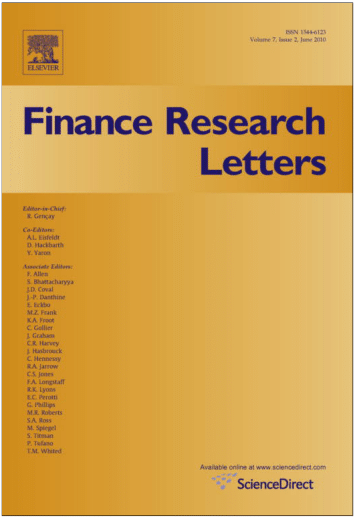
Badly Hurt? Natural Disasters and Direct Firm Effects
in: Finance Research Letters, 2019
Abstract
We investigate firm outcomes after a major flood in Germany in 2013. We robustly find that firms located in the disaster regions have significantly higher turnover, lower leverage, and higher cash in the period after 2013. We provide evidence that the effects stem from firms that already experienced a similar major disaster in 2002. Overall, our results document a positive net effect on firm performance in the direct aftermath of a natural disaster.
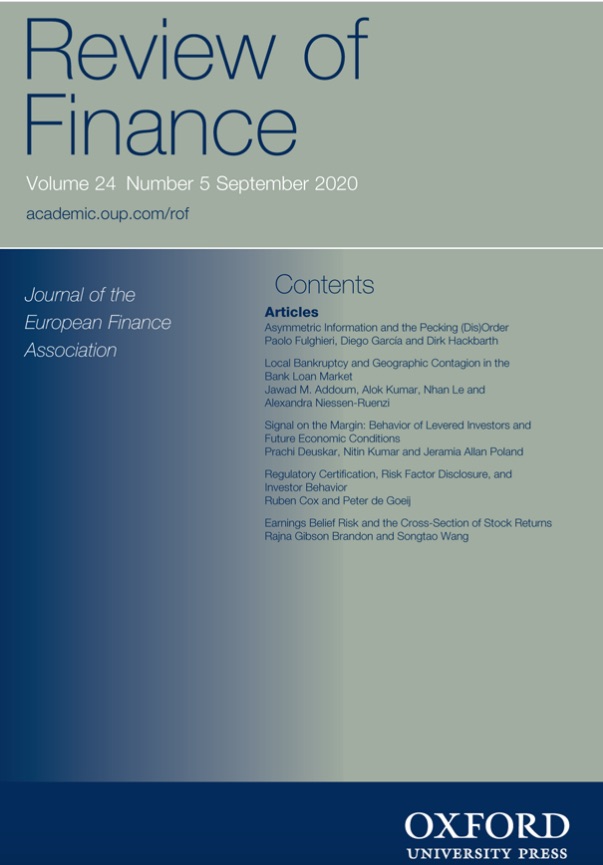
How Do Banks React to Catastrophic Events? Evidence from Hurricane Katrina
in: Review of Finance, Nr. 1, 2019
Abstract
This paper explores how banks react to an exogenous shock caused by Hurricane Katrina in 2005, and how the structure of the banking system affects economic development following the shock. Independent banks based in the disaster areas increase their risk-based capital ratios after the hurricane, while those that are part of a bank holding company on average do not. The effect on independent banks mainly comes from the subgroup of highly capitalized banks. These independent and highly capitalized banks increase their holdings in government securities and reduce their total loan exposures to non-financial firms, while also increasing new lending to these firms. With regard to local economic development, affected counties with a relatively large share of independent banks and relatively high average bank capital ratios show higher economic growth than other affected counties following the catastrophic event.

Senior Debt and Market Discipline: Evidence from Bank-to-bank Loans
in: Journal of Banking and Finance, 2019
Abstract
We empirically investigate whether taking senior bank loans would enhance market discipline and control risk-taking among borrowing banks. Controlling for endogeneity concern arising from borrowing bank self-select into taking senior bank debt, we document that both the spreads and covenants in loan contracts are sensitive to bank risk variables. Our analysis also reveals that borrowing banks reduce their risk exposure after their first issuance of senior bank debt. We also find that lending banks significantly increase their collaboration with borrowing banks and increase their presence in the home markets of borrowing banks.

Accounting Quality in Banking: The Role of Regulatory Interventions
in: Journal of Banking and Finance, 2018
Abstract
Using the full sample of U.S. banks and hand-collected data on enforcement actions over 2000–2014, we analyze the role of these interventions in promoting several aspects of accounting quality. We find that enforcement actions issued for both risk-related and accounting-related reasons lead to significant improvements in accounting quality. This improvement is consistently found for earnings smoothing, big-bath accounting, timely recognition of future loan losses, the association of loan loss provisions with future loan charge offs, loss avoidance, and cash flow predictability and earnings persistence. Most of the effects are somewhat more potent in the crisis period and survive in several sensitivity tests. Our findings highlight the imperative role of regulatory interventions in promoting bank accounting quality.
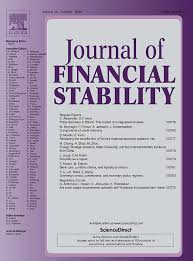
SMEs and Access to Bank Credit: Evidence on the Regional Propagation of the Financial Crisis in the UK
in: Journal of Financial Stability, 2018
Abstract
We study the sensitivity of banks’ credit supply to small and medium size enterprises (SMEs) in the UK with respect to the banks’ financial condition before and during the financial crisis. Employing unique data on the geographical location of all bank branches in the UK, we connect firms’ access to bank credit to the financial condition (i.e., bank health and the use of core deposits) of all bank branches in the vicinity of the firm for the period 2004–2011. Before the crisis, banks’ local financial conditions did not influence credit availability irrespective of the functional distance (i.e., the distance between bank branch and bank headquarters). However, during the crisis, we find that SMEs with banks within their vicinity that have stronger financial conditions faced greater credit availability when the functional distance is close. Our results point to a “flight to headquarters” effect during the financial crisis.
Arbeitspapiere
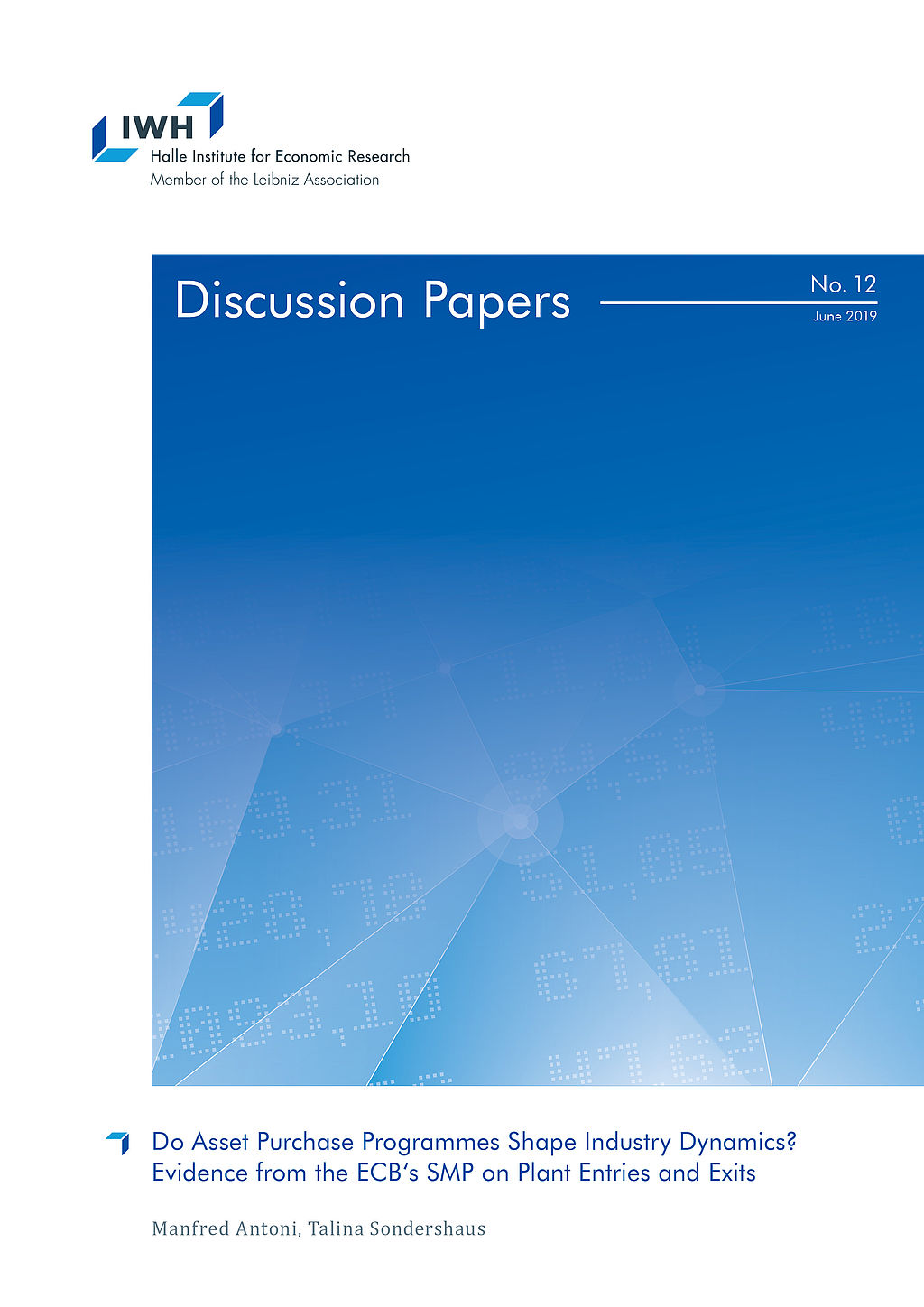
Do Asset Purchase Programmes Shape Industry Dynamics? Evidence from the ECB's SMP on Plant Entries and Exits
in: IWH Discussion Papers, Nr. 12, 2019
Abstract
Asset purchase programmes (APPs) may insulate banks from having to terminate relationships with unproductive customers. Using administrative plant and bank data, we test whether APPs impinge on industry dynamics in terms of plant entry and exit. Plants in Germany connected to banks with access to an APP are approximately 20% less likely to exit. In particular, unproductive plants connected to weak banks with APP access are less likely to close. Aggregate entry and exit rates in regional markets with high APP exposures are also lower. Thus, APPs seem to subdue Schumpeterian cleansing mechanisms, which may hamper factor reallocation and aggregate productivity growth.
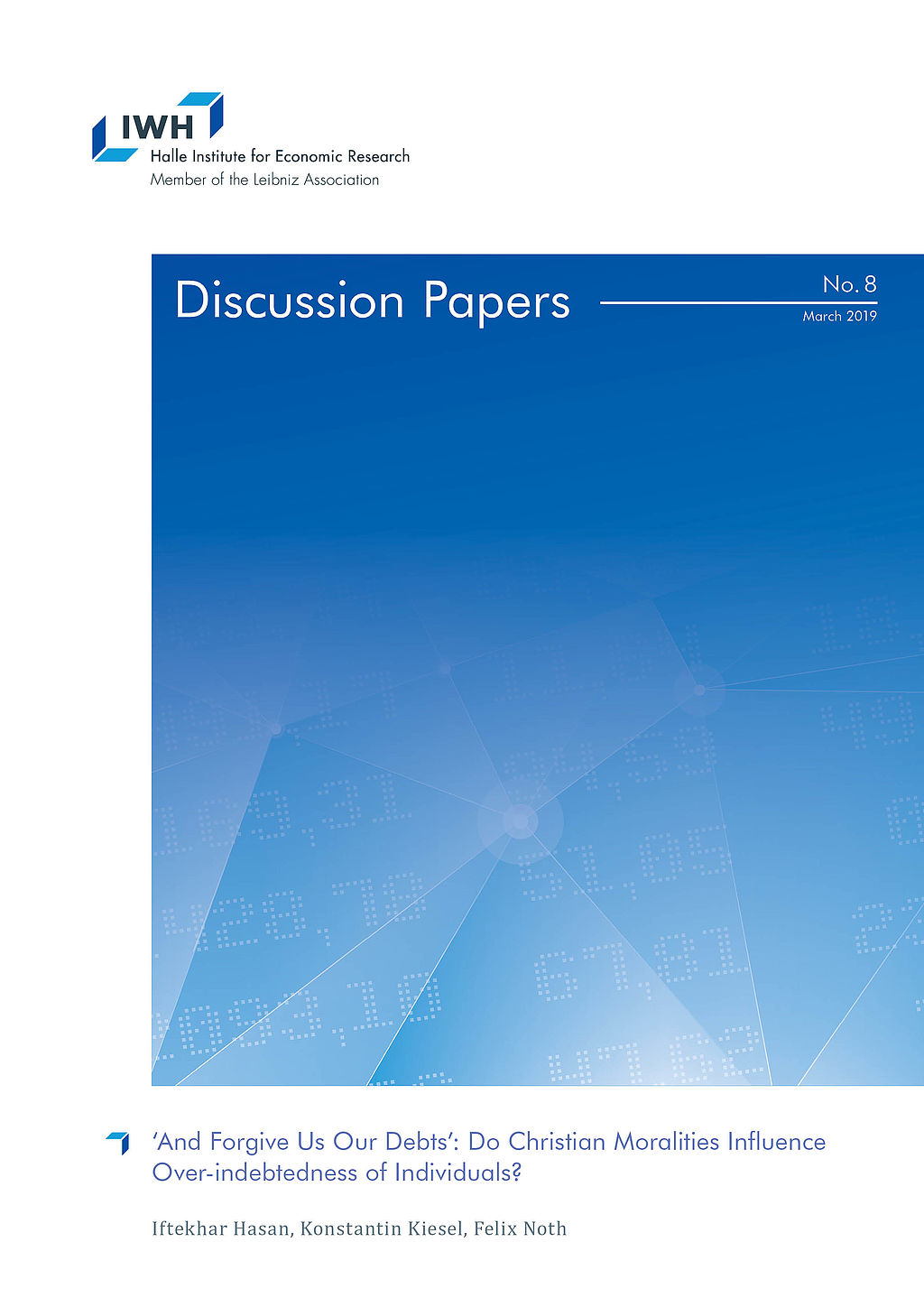
‘And Forgive Us Our Debts’: Do Christian Moralities Influence Over-indebtedness of Individuals?
in: IWH Discussion Papers, Nr. 8, 2019
Abstract
This paper analyses whether Christian moralities and rules formed differently by Catholics and Protestants impact the likelihood of households to become overindebted. We find that over-indebtedness is lower in regions in which Catholics outweigh Protestants, indicating that Catholics‘ forgiveness culture and a stricter enforcement of rules by Protestants serve as explanations for our results. Our results provide evidence that religion affects the financial situations of individuals and show that even 500 years after the split between Catholics and Protestants, the differences in the mind-sets of both denominations play an important role for situations of severe financial conditions.
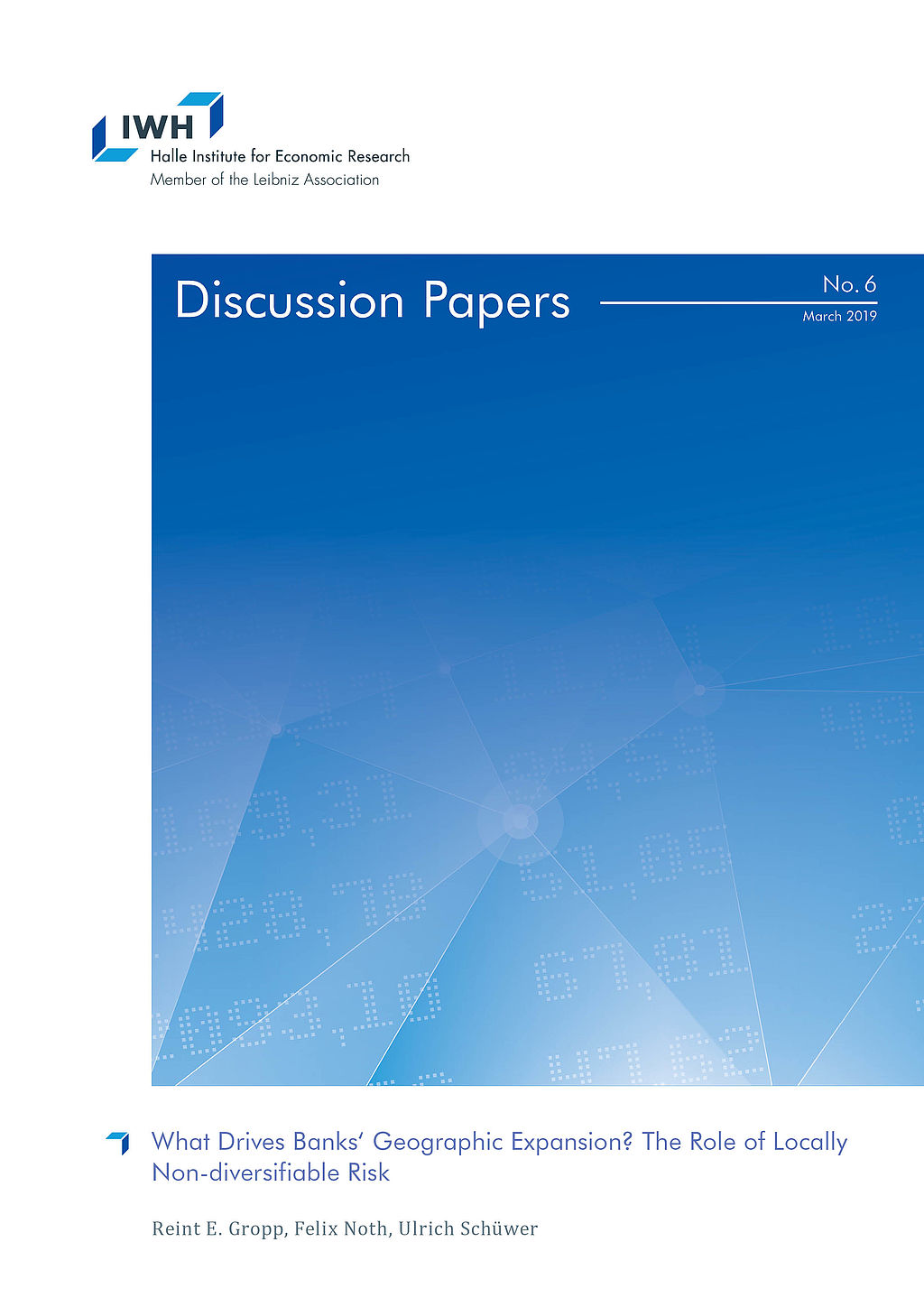
What Drives Banks‘ Geographic Expansion? The Role of Locally Non-diversifiable Risk
in: IWH Discussion Papers, Nr. 6, 2019
Abstract
We show that banks that are facing relatively high locally non-diversifiable risks in their home region expand more across states than banks that do not face such risks following branching deregulation in the 1990s and 2000s. These banks with high locally non-diversifiable risks also benefit relatively more from deregulation in terms of higher bank stability. Further, these banks expand more into counties where risks are relatively high and positively correlated with risks in their home region, suggesting that they do not only diversify but also build on their expertise in local risks when they expand into new regions.
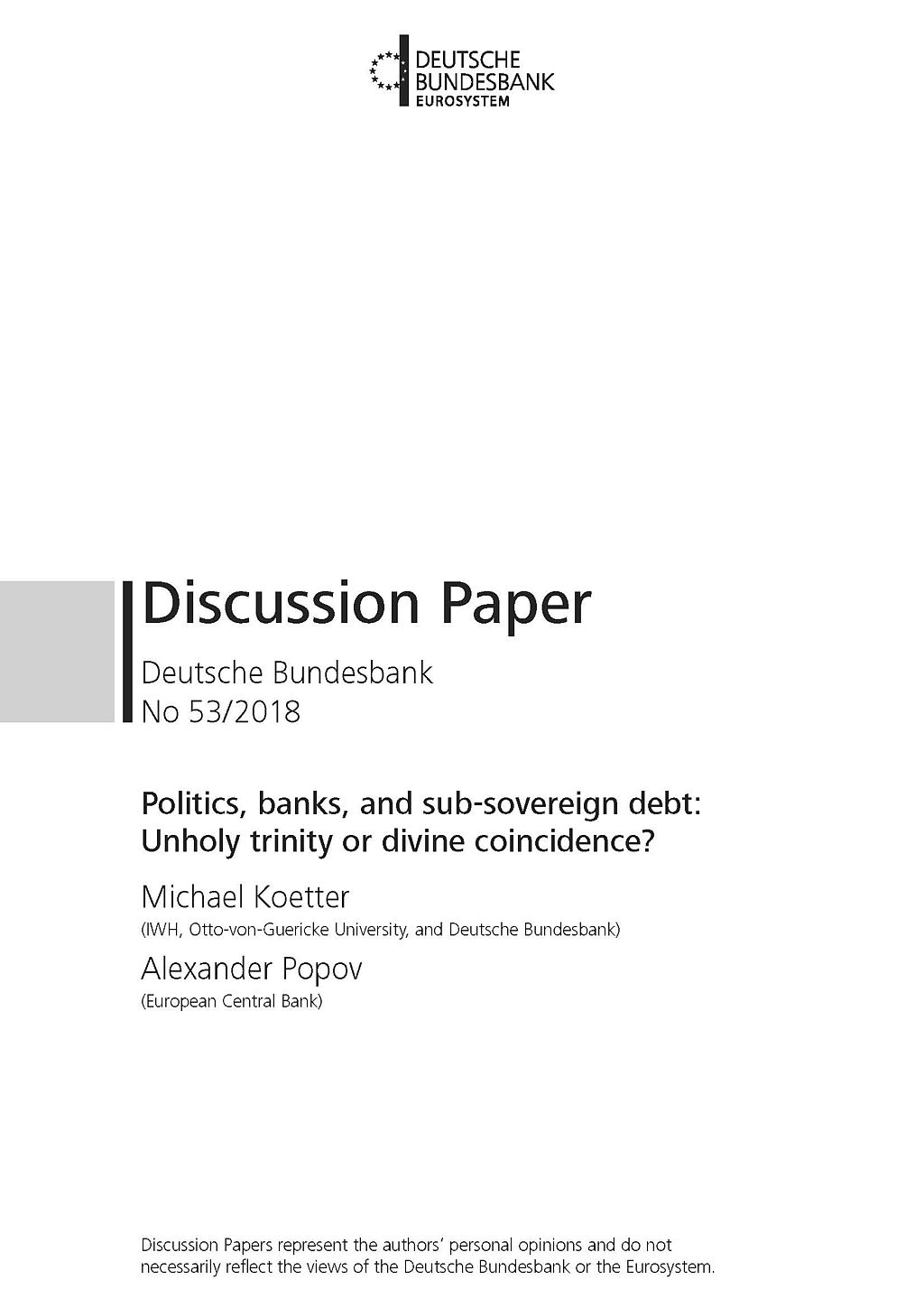
Politics, Banks, and Sub-sovereign Debt: Unholy Trinity or Divine Coincidence?
in: Deutsche Bundesbank Discussion Paper, Nr. 53, 2018
Abstract
We exploit election-driven turnover in State and local governments in Germany to study how banks adjust their securities portfolios in response to the loss of political connections. We find that local savings banks, which are owned by their host county and supervised by local politicians, increase significantly their holdings of home-State sovereign bonds when the local government and the State government are dominated by different political parties. Banks' holdings of other securities, like federal bonds, bonds issued by other States, or stocks, are not affected by election outcomes. We argue that banks use sub-sovereign bond purchases to gain access to politically distant government authorities.

May the Force Be with You: Exit Barriers, Governance Shocks, and Profitability Sclerosis in Banking
in: Deutsche Bundesbank Discussion Paper, Nr. 49, 2018
Abstract
We test whether limited market discipline imposes exit barriers and poor profitability in banking. We exploit an exogenous shock to the governance of government-owned banks: the unification of counties. County mergers lead to enforced government-owned bank mergers. We compare forced to voluntary bank exits and show that the former cause better bank profitability and efficiency at the expense of riskier financial profiles. Regarding real effects, firms exposed to forced bank mergers borrow more at lower cost, increase investment, and exhibit higher employment. Thus, reduced exit frictions in banking seem to unleash the economic potential of both banks and firms.


















